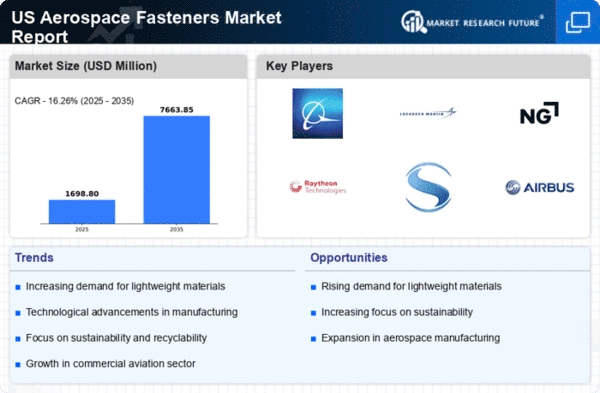Growth of Commercial Aviation Sector
The aerospace fasteners market is experiencing growth fueled by the expansion of the commercial aviation sector. With increasing air travel demand, airlines are investing in new aircraft and retrofitting existing fleets, which drives the need for reliable fasteners. The commercial aviation market is expected to grow at a CAGR of around 4% over the next five years, leading to heightened demand for aerospace fasteners. This growth is further supported by the introduction of new aircraft models that require advanced fastening solutions. As airlines prioritize safety and efficiency, the aerospace fasteners market is likely to see continued investment in innovative fastening technologies that enhance aircraft performance and longevity.
Rising Military and Defense Expenditures
The aerospace fasteners market is poised for growth due to rising military and defense expenditures in the United States. Increased funding for defense projects and modernization of military aircraft are driving demand for high-performance fasteners that meet stringent military specifications. The U.S. defense budget is projected to exceed $700 billion in the coming years, which will likely lead to a surge in procurement of aerospace fasteners for military applications. This trend not only supports the aerospace fasteners market but also encourages innovation in fastener technology to meet the unique demands of defense contracts. As military programs evolve, the need for specialized fasteners that ensure safety and reliability becomes paramount.
Regulatory Compliance and Safety Standards
The aerospace fasteners market is significantly influenced by stringent regulatory compliance and safety standards imposed by aviation authorities. These regulations necessitate the use of high-quality, reliable fasteners that can withstand extreme conditions. As a result, manufacturers are compelled to adhere to rigorous testing and certification processes, which can increase production costs but ultimately enhance product reliability. The market is projected to grow at a CAGR of around 5% over the next few years, driven by the need for compliance with these standards. This focus on safety and reliability not only boosts consumer confidence but also fosters innovation within the aerospace fasteners market, as companies strive to develop products that meet or exceed regulatory expectations.
Increasing Demand for Lightweight Materials
The aerospace fasteners market is experiencing a notable shift towards lightweight materials, driven by the aerospace industry's need for fuel efficiency and performance enhancement. As aircraft manufacturers seek to reduce overall weight, the demand for advanced fasteners made from materials such as titanium and composite materials is rising. This trend is reflected in the projected growth of the aerospace fasteners market, which is expected to reach approximately $7 billion by 2026. Lightweight fasteners not only contribute to fuel savings but also improve the overall structural integrity of aircraft. Consequently, manufacturers are investing in research and development to create innovative fastening solutions that meet these evolving requirements, thereby propelling the aerospace fasteners market forward.
Expansion of Aerospace Manufacturing Facilities
The aerospace fasteners market is benefiting from the expansion of aerospace manufacturing facilities across the United States. As major aerospace companies invest in new production plants and upgrade existing facilities, the demand for fasteners is expected to rise correspondingly. This trend is particularly evident in states with a strong aerospace presence, such as Washington and California. The increase in manufacturing capacity is projected to contribute to a market growth rate of approximately 6% annually. Furthermore, the establishment of advanced manufacturing technologies, such as automation and additive manufacturing, is likely to enhance production efficiency and reduce lead times, thereby positively impacting the aerospace fasteners market.

















